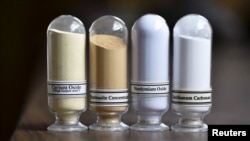The United States will team up with Canada and Australia to help countries around the world develop their reserves of minerals like lithium, copper and cobalt, the State Department said on Tuesday, part of a multi-pronged strategy to reduce global reliance on China for materials crucial to high-tech industries.
Washington grew more concerned recently about its dependence on mineral imports after Beijing suggested using them as leverage in the trade war between the world's largest economic powers.
This would interrupt the manufacture of a wide range of consumer, industrial and military goods, including mobile phones, electric vehicles, batteries, and fighter jets.
"Over 80 percent of the global supply chain of rare earth elements -- is controlled by one country," the State Department said in a fact sheet outlining the effort, which it has dubbed the Energy Resource Governance Initiative. "Reliance on any one source increases the risk of supply disruptions."
Under the plan, the United States will share mining expertise with other countries to help them discover and develop their resources, and advise on management and governance frameworks to help ensure their industries are attractive to international investors.
Doing so will help to ensure global supply for the minerals can meet world demand, which is projected to surge alongside the growing take-up in high-technology goods. "Demand for critical energy minerals could increase almost 1,000% by 2050," according to the fact sheet.
Frank Fannon, the U.S. assistant secretary of state for energy resources, said in an interview that tensions with China show the United States should be producing more rare earth minerals and help others ensure a secure supply. "We need to do more and we are not alone in this," Fannon said.
Canada and Australia, two major mining countries, were partnering in the effort and other allies could join later, a U.S. official said.
Canada's Ambassador to the United States, David MacNaughton, said Canadian officials have met with the State Department several times to discuss critical minerals and environmental issues around global mining and he looks forward to advancing the initiative.
Representatives of Australia did not immediately respond to a request for comment.
The plan was first reported on Tuesday morning by the Financial Times.
The plan comes a week after the U.S. Commerce Department recommended urgent steps to boost U.S. domestic production of "critical minerals," including by providing low-interest loans to mining companies and requiring defense companies to "buy American."
The Commerce report also recommended that U.S. agencies review areas that are currently protected from development and assess whether those restrictions should be lifted or reduced to allow for critical minerals development.





